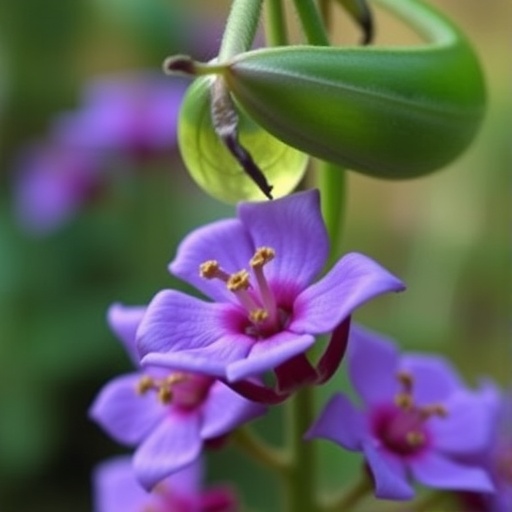In a groundbreaking study, researchers B. Jedidi and H.M. Sbihi explore the lesser-known yet potent characteristics of Marrubium vulgare seed oil, shedding light on its physicochemical properties and bioactive lipid composition. This investigation, published in the journal Waste Biomass Valor, opens new possibilities for the utilization of this natural resource, emphasizing its value in the realms of nutrition, pharmaceuticals, and sustainable agriculture.
Marrubium vulgare, commonly known as white horehound, has been utilized in traditional medicine for centuries. The plant is renowned not just for its medicinal properties but for its ability to thrive in arid environments, making it a valuable candidate for sustainable agricultural practices. The researchers focused on the seed oil derived from this plant, which remains relatively under-researched compared to its more popular counterparts. This study provides a comprehensive analysis that could pave the way for innovative applications.
In the study, the authors conducted rigorous experiments to delineate the physicochemical properties of Marrubium vulgare seed oil. These properties include key parameters such as viscosity, density, and specific gravity, which are essential for understanding the oil’s behavior in various applications. The results indicate that the oil possesses unique characteristics that could enhance its performance in food, cosmetic, and pharmaceutical formulations.
The research further delves into the bioactive lipid composition of the seed oil, revealing a rich array of fatty acids. Notably, the oil contains significant levels of linoleic and oleic acids, which are known for their roles in promoting heart health and overall well-being. The presence of these beneficial compounds suggests that Marrubium vulgare seed oil could serve as a functional ingredient in dietary supplements and health-promoting products.
Jedidi and Sbihi also assessed the oil’s antioxidant properties, which are critical in combating oxidative stress in living organisms. The findings suggest that the bioactive components in the oil can effectively scavenge free radicals, providing a natural defense mechanism against cellular damage. This attribute makes it an attractive option for incorporation into health foods and cosmetics aimed at enhancing skin health and longevity.
An interesting aspect of this study is the emphasis on sustainability. As the global focus shifts toward eco-friendly solutions, the utilization of Marrubium vulgare seed oil presents a dual advantage: it not only has health benefits but is also derived from a plant that requires minimal resources to cultivate. This aligns with the growing demand for sustainable practices within various industries, particularly in food production and cosmetic formulations.
The research underscores the potential market opportunities for Marrubium vulgare seed oil. With increasing consumer awareness regarding the benefits of natural and organic products, the market for such oils is expected to expand. The authors suggest that collaborations between agricultural producers and manufacturers could facilitate the commercialization of this unique seed oil, ensuring that the plant’s numerous advantages are fully leveraged.
Moreover, the study addresses the challenges associated with extraction and refinement processes of natural oils. Jedidi and Sbihi provide insights into the methods that maximize yield and maintain the integrity of bioactive compounds. The optimization of these processes could significantly influence the scalability of Merrubium vulgare oil production, making it economically viable for wider applications.
The research contributes significantly to the body of knowledge regarding the potential applications of lesser-known seed oils. By providing a detailed analysis of Marrubium vulgare seed oil, the authors encourage further research in the field. They highlight the necessity for more studies aimed at exploring the full spectrum of benefits and applications that this seed oil can offer.
Looking ahead, the researchers call for additional exploration into the synergistic effects of combining Marrubium vulgare seed oil with other natural ingredients. There is potential for developing enhanced formulations that leverage the combined health benefits of these oils, thus creating innovative products that resonate with health-conscious consumers.
Furthermore, the study propels the quest for alternative and sustainable resources in the face of a global health crisis, where reliance on synthetic chemicals is increasingly scrutinized. The pharmacological properties of Marrubium vulgare oil add another layer of appeal, as researchers aim to investigate its effects on various ailments, including respiratory and metabolic disorders.
In conclusion, the research conducted by Jedidi and Sbihi represents a significant step forward in understanding the potential of Marrubium vulgare seed oil. With its unique physicochemical properties, rich bioactive lipid composition, and sustainable advantages, this seed oil is poised to play an important role in health and wellness industries. The findings hold promise for future research and commercial investments, ultimately transforming an overlooked natural resource into a widely recognized commodity.
As the study emphasizes the critical intersection of sustainability and health, it serves as a clarion call for researchers, agriculturalists, and product developers alike to capitalize on the myriad benefits offered by Marrubium vulgare seed oil. The journey toward uncovering the full potential of this natural product is just beginning, and the future looks bright.
Subject of Research: Physicochemical Properties and Bioactive Lipid Composition of Marrubium Vulgare Seed Oil
Article Title: Physicochemical Properties and Bioactive Lipid Composition of Marrubium Vulgare Seed Oil
Article References:
Jedidi, B., Sbihi, H.M. Physicochemical Properties and Bioactive Lipid Composition of Marrubium Vulgare Seed Oil. Waste Biomass Valor (2025). https://doi.org/10.1007/s12649-025-03321-0
Image Credits: AI Generated
DOI: 10.1007/s12649-025-03321-0
Keywords: Marrubium vulgare, seed oil, physicochemical properties, bioactive lipids, sustainability, health benefits, antioxidant properties.




